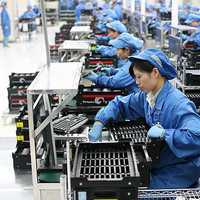China's spreading labor unrest is rightfully portrayed in the Western press as an immense challenge to that country's status as the "world's factory floor." But to Beijing's bosses, it's likewise a tool for addressing rising income inequality, which is why the Communist Party has remained most reticent to address it head on. Such a hands-off approach carries additional dangers, however, the most prominent being that, once emerging labor activists get a taste for pressing their collective demands, China's political leaders could find themselves riding a Solidarnosc-like trade-union tiger that's not easily tamed.
China has long suffered isolated sparks of labor unrest, but usually in smaller factories where media blackouts were easier to enforce and where local cops could more easily break up protests. The strikes also tended to revolve around Dickensian work conditions. What's new this year is that workers are striking at better-run, foreign-owned factories along the highly industrialized coast, meaning the focus is shifting to wages. While local media coverage remains muzzled, foreign coverage has been extensive, allowing increasingly networked laborers to compare notes over cell phones and instant-messaging services. Such connectivity has given rise to copycat strikes, a super-empowering phenomenon that signals the growing irrelevancy of China's single official trade union.
The results have been predictable enough. Left hanging by the government and facing factory-floor suicides, foreign firms have granted wage increases in the range of 25 percent to 30 percent. Industry analysts and foreign firms can see the writing on the wall: China's seemingly inexhaustible supply of pliant young labor has been pushed to limits both natural and unnatural, meaning the nation's "cheap labor" advantage has peaked. What comes next is familiar enough to any advanced economy: Firms will go elsewhere in search of the next cheapest pool of workers just off the farm.

